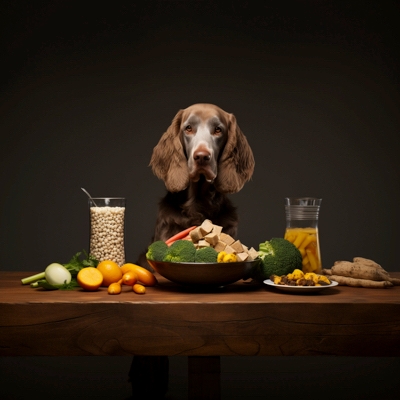Fluff or Pudge? A Guide to Managing Your Dog’s Weight:
Summary:
Is your furry friend more fluff or pudge? Managing your dog's weight is crucial for their overall health and well-being. This guide dives deep into recognizing the signs of an overweight dog, understanding the health risks, and decoding dog nutrition. With tips on exercise, choosing the right dog food, and the importance of regular vet visits, you'll be equipped to ensure your dog is at their healthiest. Celebrate each milestone in your dog's weight management journey and enjoy the joys of a fit, active, and happy canine companion.


- Spotting the Signs of an Overweight Pooch
- The Health Implications of Extra Pounds
- Decoding Dog Nutrition and Serving Sizes
- The Role of Exercise in Weight Management
- Selecting Nutritious Dog Food
- The Importance of Regular Vet Visits
- Addressing Potential Health Concerns
- Celebrating Your Dog's Weight Management Journey
Spotting the Signs of an Overweight Pooch
We've all had that moment, looking at our beloved furball and wondering, "Is that all fluff, or is there some extra pudge under there?" Recognizing if your dog is overweight starts with a simple touch test. Can you feel their ribs without pressing hard? If not, there might be some extra weight. Other signs include a lack of a visible waist, difficulty moving around, and even breathing issues. Changes in behavior, such as increased lethargy or a sudden disinterest in activities they once loved, can also be indicators. Remember, every dog is unique, so what might be overweight for one breed might be expected for another.
The Health Implications of Extra Pounds
Carrying extra weight isn't just a cosmetic issue for dogs; it can lead to many health problems. Overweight dogs are at a higher risk of developing diseases like diabetes, heart conditions, and certain cancers. Those extra pounds can strain their joints, leading to arthritis and mobility issues. And, as heartbreaking as it is, obesity can reduce your dog's lifespan. But it's not just about physical health; being overweight can also impact a dog's mental well-being, leading to depression or anxiety.
Decoding Dog Nutrition and Serving Sizes
Navigating the world of dog food can be daunting. With so many options, how do you choose the right one? Start by understanding your dog's nutritional needs based on their age, breed, and activity level. Portion control is crucial. Overfeeding is a common culprit behind canine obesity. Avoid giving table scraps, no matter how pleading those puppy eyes are. And when it comes to treats, moderation is key. Consider investing in high-quality dog food like Blue Buffalo Healthy Weight Formula, designed to support healthy weight management.
The Role of Exercise in Weight Management
Like humans, dogs need regular exercise to stay fit and healthy. The type and amount of exercise will vary based on your dog's breed, age, and health. From brisk walks in Portland's parks to playing fetch or agility training, there are countless ways to keep your dog active. Remember to adjust the intensity and duration of exercise, especially if your dog is starting their weight loss journey. And always keep an eye out for signs of exhaustion or discomfort.
The right food can make a difference in your dog's weight management journey. Look for dog food with high-quality protein sources, whole grains, and natural ingredients. Avoid foods with fillers, artificial additives, or excessive fats. Brands like Orijen offer grain-free options packed with fresh, regional ingredients. And don't forget to provide fresh water at all times!
The Importance of Regular Vet Visits
Your vet is an invaluable resource in your dog's weight management journey. Regular check-ups can help monitor your dog's weight, guide nutrition and exercise, and catch any potential health issues early on. Your vet can advise on portion sizes, recommend specific dog food brands, and even provide your pup with a tailored weight loss plan.
Addressing Potential Health Concerns
Dog weight gain can sometimes be due to underlying health issues like thyroid problems or hormonal imbalances. If you notice sudden weight gain, changes in appetite, or other unusual symptoms, you must consult your vet. Addressing these health concerns early on can prevent complications and ensure your dog gets the proper treatment.
Celebrating Your Dog's Weight Management Journey
Every pound lost, every new activity tried, and every dietary change is a step towards a healthier, happier dog. Celebrate these milestones, no matter how small. Share your dog's journey with fellow dog owners, seek support when needed, and remember to enjoy the process. After all, it's not just about the destination but the journey you share with your four-legged friend.
As the iconic Portland bridges cast their reflections on the Willamette River, take a moment to reflect on your dog's journey to a healthier weight. It's a path filled with challenges, learning, and countless tail-wagging moments. With the proper knowledge, support, and a sprinkle of Portland spirit, you and your dog can conquer any weight challenge that comes your way. So, as you embark on this journey, remember that every step, choice, and moment is a testament to your love and care for your furry friend.


